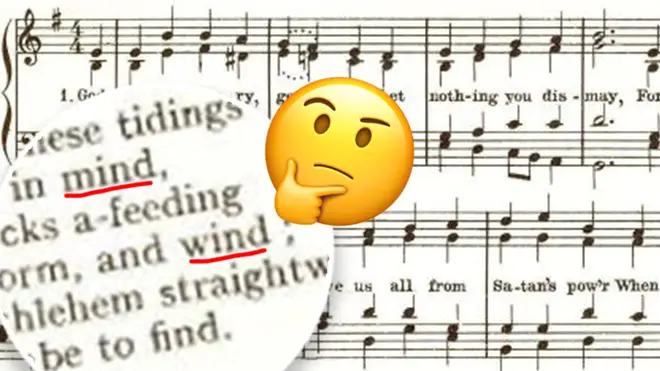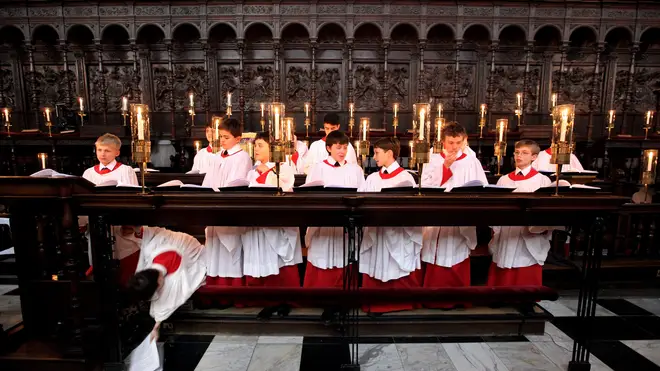On Air Now
Classic FM Breakfast with Tim Lihoreau 7am - 9am
11 December 2020, 16:36 | Updated: 11 December 2020, 16:37

The third verse of ‘God Rest Ye Merry, Gentlemen’ rhymes ‘wind’ – as in breeze – with ‘mind’. We explain why.
‘God Rest Ye Merry, Gentleman’, dating all the way back to the 16th century, is one of the oldest Christmas carols in existence. It’s so old, in fact, that it pre-dates the modern system of harmony.
Today it’s one of our favourite minor-key carols, along with ‘Coventry Carol’ and ‘We Three Kings’.
But... that’s not why the Internet is talking about it. It’s all to do with a slightly stilted rhyme in its third verse. One that’s vexed carollers for years.
The 4th verse of God Rest Ye Merry Gentlemen rhymes mind and wind (as in blowing air). Why? One has a short vowel and the other has a long one. This makes no sense, hymnwriter of old.
— Kristen (@TheFrugalGirl) December 22, 2017
The mind-wind-find rhyme in God Rest Ye Merry Gentlemen will never not make me feel itchy in between my ears.
— Itsmotherswork (@itsmotherswork) December 25, 2013
Something that still bothers me: on God Rest Ye Merry Gentlemen, “mind” and “wind” DO NOT RHYME. OR RIM.
— MA - BLACK LIVES MATTER (@simplyaMAhzing) November 6, 2019
English pronunciation has gone through a lot of changes since the 16th century. Over two or three centuries, a so-called Great Vowel Shift took place – essentially, a series of changes in pronunciation that affected long vowel sounds used in the English language.
And by the 18th century, long vowels had shifted upwards. So, a vowel that was once pronounced in a lower place in the mouth would be pronounced in a different place, higher up in the mouth.
This means the word ‘wind’ used to be pronounced ‘waind’, as in ‘find’.
Read more: The 30 greatest Christmas carols of all time >

King's College Cambridge 2010 #10 God Rest You Merry, Gentlemen
Until a few hundred years ago – so confirms the Oxford English Dictionary – ‘waind’ used to be the normal English pronunciation for ‘wind’ when used in poetry.
Today, some choirmasters opt to use the Middle English pronunciation of ‘wind’, for rhyme’s sake.
But most choirs and carol singers tend to adopt the modern pronunciation, embracing the slightly stilted half-rhyme.
Just one of the wonderfully quirky stories in the Christmas singing tradition. Find out all about the history of carolling here.

God rest ye merry gentlemen
Let nothing you dismay
For Jesus Christ our Saviour
Was born on Christmas Day
To save us all from Satan's pow'r
When we were gone astray
O tidings of comfort and joy
Comfort and joy
O tidings of comfort and joy
From God our Heavenly Father
A blessed Angel came;
And unto certain shepherds
Brought tidings of the same,
How that in Bethlehem was born
The Son of God by Name.
O tidings of comfort and joy,
Comfort and joy
O tidings of comfort and joy
The shepherds at those tidings
Rejoiced much in mind,
And left their flocks a-feeding
In tempest, storm and wind,
And went to Bethlehem straightway
The Son of God to find.
O tidings of comfort and joy,
Comfort and joy
O tidings of comfort and joy
But when to Bethlehem they came,
Whereat this infant lay,
They found Him in a manger,
Where oxen feed on hay;
His Mother Mary kneeling down,
Unto the Lord did pray.
O tidings of comfort and joy,
Comfort and joy
O tidings of comfort and joy
Now to the Lord sing praises,
All you within this place,
And with true love and brotherhood
Each other now embrace;
This holy tide of Christmas
All other doth deface.
O tidings of comfort and joy,
Comfort and joy
O tidings of comfort and joy.